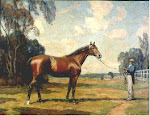WOLF HALL by Hilary Mantel, 2009.
English author Mantel has written a huge, sprawling story concerning Thomas Cromwell, who rose to prominence under Henry VIII during the time of the king's "Great Matter." Henry wished to divorce his wife Katharine of Aragon after 20 years of marriage and then marry the captivating Anne Boleyn. Looming in the background, foreground, and everywhere, was Henry's desire and need for a male heir.
The author has done a terrific job with describing how Cromwell, son of a brutish blacksmith, manages to escape his dreadful childhood, spends years abroad, returns to England and becomes Cardinal Wolsey's go-to guy. After Wolsey's fall, Cromwell continues his rise to power, and finds that he is living a life beyond his wildest expectations. Cromwell, charming, knowledgeable, enigmatic, opportunistic, ambitious, and an enormously successful strategist, becomes crucial in Henry's and Anne's intertwined lives. She does well with making him a well rounded person, showing him as a kind and loving family man, as well as the courtly manipulator he was.
This is a hugely entertaining book, filled with larger than life characters and events, and Mantel's writing truly makes the era come to life. Political machinations, judicial murders, religious upheaval and persecution and executions, threats from rival claimants for the throne, wars, plague, etc. are all part of the story. I found her portrayals of Queen Katharine, Mary Tudor, Cardinal Wolsey, Elizabeth Barton, Hans Holbein and others very credible. The tragedy of Sir Thomas More was an interesting and moving section, and it was amazing what she was able to do to make so many characters stand out and be memorable: Mary Boleyn, Jane Seymour, Lady Rochford, and Bishop Gardiner, among so many others.
My only complaint about this novel is that it was very difficult and at times frustrating to keep track of who was saying what to whom. It took too much time to figure that out, and as a result, made for a slow read. Other than that, I found it a fresh take on an often written about episode in history. Kudos to Mantel for choosing to tell the story using Cromwell as the main voice and creating a different perspective on this Tudor period.




